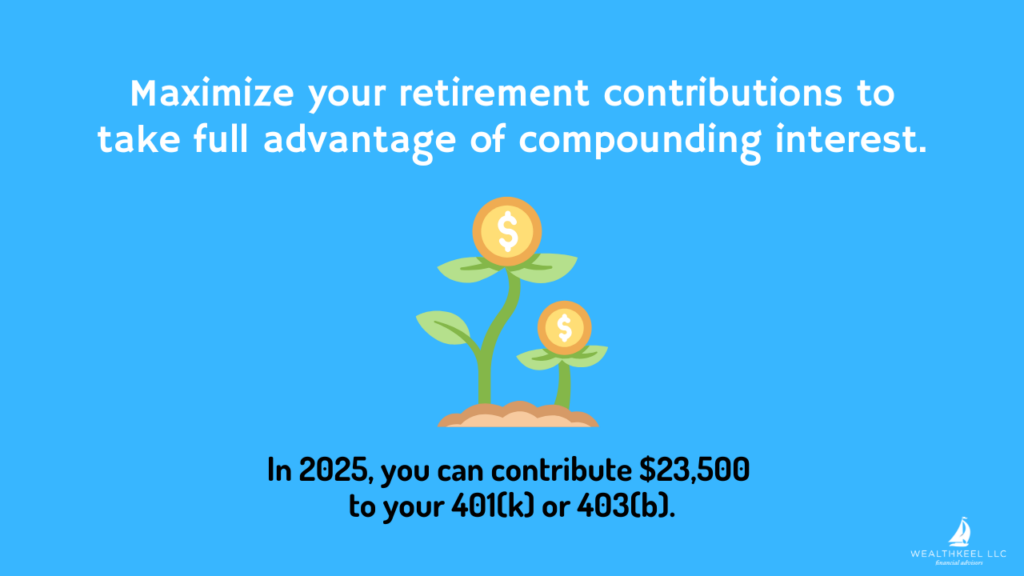Are you among a growing group of people in the U.S. who have a high household income, yet your savings never seem to grow significantly year after year?
Believe it or not, there’s a name for that: HENRY. HENRY stands for “High Earners, Not Rich Yet,” and refers to anyone with a high income but low net worth. For HENRYs, it can be frustrating to feel like they’re not getting ahead, even if their income is well above the average.
Many of our new clients are HENRYs. These clients may be young, but they are out there crushing it in the real world as world-class physicians. However, they’re also burdened by student loans and other debt.
But just because you currently have little savings doesn’t mean it has to stay that way forever. We’ll cover exactly what “HENRY” means, how many physicians fall into this category, and how to start building wealth in your 20s and 30s.
Key Takeaways
- Many new-to-practice physicians are HENRY’s, meaning they make a lot of money, but they don’t have a significant net worth because they are buried in student debt and don’t have a lot of other savings or investments.
- New physicians can start to build their net worth by understanding their debts, taking stock of their assets, and intentionally aligning their money with their goals.
- Paying off debt, reducing expenses, increasing investments, setting clear goals, and creating a solid plan are all excellent ways to leave the HENRY lifestyle behind.
Prefer video over the blog? We’ve got you covered! Watch our YouTube video as we dissect this blog post for you.
What is a HENRY (And Is It You)?
The definition of a HENRY tends to be much more fluid than similar acronyms, and it can change depending on who you ask. The confusion usually centers on exactly how much a household needs to earn before it qualifies as a “high earner,” as well as the general age range for categorizing someone as a HENRY.
Although most people place the household income of HENRYs somewhere between $250,000 and $500,000, some lower the threshold to $100,000 a year in earnings. This lower income requirement dramatically increases the number of potential HENRYs.
The most popular definition of HENRY only includes Millennials or those born between 1981 and 1996. But, again, there’s some disagreement about whether it is appropriate to restrict the term to a single generation. Some people prefer to adopt a more inclusive definition of the term, pushing the top end of the age bracket to 55.
Common HENRY characteristics include:
- A higher-than-average income level: These individuals have high incomes over $100,000.
- Little to no savings: Despite their high incomes, they don’t have significant savings.
- Feelings of low material wealth: Despite their income level, these individuals don’t feel wealthy, leading some financial experts to dub them the “working rich” — those who must continue to work potentially long hours despite high-earning careers.
How to Stop Being a HENRY
HENRYs have it tough.
They typically work long hours and earn a good salary but have little to show for it. They may have to pay a significant portion of their income in taxes, student loans, and high living expenses.
As a result, instead of living like the top 1 percent of earners in the U.S., HENRYs wind up feeling the same as any other worker living paycheck to paycheck. Surprisingly enough, about 40% of Americans earning more than $100,000 a year live paycheck to paycheck, and that’s a problem.
There’s really only one way to stop being a HENRY: increase your net worth! Your net worth is the simplest indicator of your overall financial well-being. Simply defined, it’s the difference between your assets (such as investment accounts, retirement funds, and properties) minus all liabilities (including mortgages, credit card debt, and other loans).
Your net worth is essential in helping you determine how much debt you have and how it can affect your future wealth. Below are a few strategies high earners can use to break the cycle and start building wealth.
1. Make a Comprehensive Financial List and Start Setting Some Goals
If you’re feeling overwhelmed by the state of your finances, it can help to make a list. Try to make this list as comprehensive as possible and include elements like your income, spending, savings, debt, and goals for the future.
The first step to changing your financial habits is knowing what they are. By reviewing where you’re currently at, you can make more informed decisions about how much you need to save/spend/invest to meet your financial goals.
Identifying your spending patterns may not be all that fun. In the process, you’ll likely realize some glaring areas where you’re spending too much—a fancy apartment, several nights out, retail therapy, expensive hobbies, etc.
Once you clarify your blind spots, you can redirect those funds to avenues that will actually help you grow, like paying more toward your student loan debt, padding your emergency savings, investing more into your 401(k) or workplace retirement plan, etc.
Remember, you aren’t cutting back on expenses because you’re a masochist or investing just to see the numbers on your account grow (though that’s fun, too). You’re doing all of these things so you can reach your goals.
Now’s the time to remind yourself of what those goals are. Perhaps you want to buy your first house, save for a wedding to marry the love of your life, get rid of one of your student loans, etc. Creating solid, definable goals can help you create a better plan for the future and keep you motivated to stay on track.
2. Review Your Liabilities and Pay Off Debt
Paying off debt is one of the simplest ways to raise your net worth. To get started, make a list of all:
- Current debts, including information about the amount you owe
- Corresponding interest rates
- Your monthly payment
These may include student loans, credit card debt, car loans, and mortgages.
Once you have this overwhelming list of all the debts you have, don’t panic. An excellent place to start is first to focus on paying off the debts with the highest interest rates.
Why?
High-interest rates translate to paying more money over the life of the loan. Let’s look at an example using a student loan calculator. Say you have a $50,000 loan you plan to pay off over a 10-year term.
- Loan A has 7% interest—you’ll pay about $19,600 in interest over the life of the loan.
- Loan B has 3% interest—you’ll pay about $8,000 in interest over the life of the loan.
The bottom line? Interest payments really add up!
After you’ve paid off your high-interest debt, you can start working on other low-interest debts.
If you’re not in a position to make extra payments on your debt, a good alternative is to ask your creditor to lower your interest rate — what’s the worst they can say?
As you saw from the brief example above, lower interest rates reduce the amount you pay over the life of the loan and allow you to pay down the principal faster.
If you carry a balance on your credit cards month-to-month, consider calling your credit card company to ask for a lower rate. Often, they will accept your request if you have been a customer for several years and have consistently made your payments on time.
There is no guarantee your creditor will lower your rate, but it never hurts to ask!
3. Review and Increase Your Assets
You started with the scary part: reviewing your debts.
Now, it’s time to look at your assets, like your 401(k), Roth IRA, brokerage account, emergency savings, checking/savings account, real estate, collectibles, etc. Ask yourself,
- What’s the total worth of your assets today? What will it be in 5 years from now? What about 10, 20, or 30 years? While your 401(k) may only be worth $20,000 or so today, it’s likely to appreciate significantly by the time you retire. On the flip side, your fancy sports car is depreciating — so don’t waste your resources on a car you can’t afford.
- Are your assets appreciating or depreciating?
- How much equity do you have in your home? Do you have rental properties? Are they performing well today, and what’s the future projection?
- What is the state of your stock investments, bonds, mutual funds, and/or retirement funds?
Ask yourself as many questions as possible about your assets and review them thoroughly. It’s important to make sure your assets align with both your long-term and short-term goals.
Ideally, your income will allow you to increase your assets while simultaneously lowering your debt, and your net worth will increase as a result.
4. Reduce Day-To-Day Expenses
Many HENRYs have a high income, but a significant chunk of their monthly earnings is dedicated to daily expenses. Reducing your expenses is easier said than done, but it’s a great way to help boost your net worth by increasing savings.
Take a look at your cash flow and see if there are any costs you can afford to cut back on. The less money you spend, the more you’ll be able to save, invest, etc.
How can you stick with this plan? Set a realistic budget. Yes, the financial “b” word is back.
Setting and sticking to a monthly budget can help you reign in your spending. Creating a budget also allows you to see how your money is being spent.
Once you know where your money is going, you can decide whether that spending aligns with your goals. Does your $500 a month car payment really add value to your life? Do you need to splurge for the $50 wine, or will the Two-Buck Chuck be just fine? Are you subscribing to one too many streaming services?
Instead of drastically overhauling your spending overnight, focus on making small, incremental changes you can build on. Using your budget to identify areas of spending to cut back on is an easy way for you to create more money to pay down debt or increase savings with or without trying to increase your income.
5. Avoid Buying an Expensive Car
It can be tempting to use your high income to purchase a fancy new car but try to avoid this temptation — seriously.
Cars are typically bad investments: They depreciate as soon as you drive them off the lot, and expensive cars come with hefty down payments and monthly expenses on top of accumulated interest and maintenance costs.
A pricey car can make it even more challenging to build your net worth and stop being a HENRY. Instead of springing for an expensive vehicle, choosing a more affordable car is a good idea. Consider purchasing a car with cash, or taking out only a — very, very — small loan. Once you’ve paid off your vehicle, you can focus on paying down other types of debt, increasing savings, and building your wealth.
This isn’t to say that you can never purchase an expensive car, just that it usually makes sense to wait until you’re on sound financial footing to do so. Once you’ve paid down debt, built up savings, and are in a comfortable place financially, you’ll be in a much better position to enjoy your new vehicle.
6. Find New Sources of Income
Increasing your income is a surefire way to boost your net worth over time.
But this doesn’t just mean receiving raises at work—it can also mean adopting freelance gigs or side hustles. Not only will additional income help you pay off your debts sooner, but it can also mean that you’ll need to borrow money less often.
Common sources of additional income include second jobs, freelance work, selling items online, or starting a part-time business. Even just a small amount of extra money per week can help you to achieve your financial goals much faster. There are plenty of opportunities for additional income out there; you just need to find the one that works for you.
7. Maximize Retirement Contributions
Maximizing your retirement contributions is another way to make the most of your income and build your net worth.
Your 20s and 30s may still seem a world away from retirement, but it’s essential to start early to take advantage of compounding interest. Retirement contributions benefit you in two primary ways.
- First, most retirement contributions are deducted before taxes, which means they reduce your overall taxable income each year — a big win for HENRY’s with big tax bills. In 2025, you can contribute $23,500 to your 401(k) — that’s an opportunity to reduce your taxable income by $23,000.
- Second, they boost your available generative assets and allow you to grow your wealth through the power of compound interest. Compound interest is a miracle, so take advantage of it. Let’s look at a small example using a compound interest calculator. Say you made an initial $1,000 investment and put in $100 a month for 5 years. Assuming a 6% return, your $1,000 is projected to turn into over $8,000—abracadabra!
If your employer offers a retirement plan, start contributing today! It’s also smart to take advantage of any contribution match your employer offers. For example, if your employer offers a 50% match on the first 6% you contribute, make sure you contribute at least 6% of your salary.
As you progress throughout your career, you’ll likely need to contribute far more than the amount to qualify for the match to retire on time. The next step is to max out your contributions — $23,500 in 2025.
If you receive any pay increases, funnel these additional funds directly into your retirement savings rather than increasing your day-to-day living expenses. Doing so can help you effortlessly grow your retirement savings while maintaining your current quality of life.
8. Store Your Money Where It Can Grow
Once you’ve saved up an emergency fund with three to six months’ worth of living expenses, avoid storing the remainder of your savings in a savings account.
Instead, keep these funds in interest-bearing accounts or invest your money where it can work for you. Over time, compound interest can significantly impact your overall net worth.
The more you save, and the earlier you do it, the higher your net worth is likely to be later in life.
If you want to be even more on the ball, set up regular contributions to retirement and investment accounts to get in the habit of saving and make investing in your future part of your routine.
9. Save for Emergencies
Life happens, and it’s critical to plan for it. One of the most important things to consider when making a financial plan is to prepare for emergencies.
Your emergency fund can help cover expenses if you lose your job, your car breaks down, you have unexpected medical bills, etc. In general, we recommend having about three to six months of living expenses, or roughly $20,000 in case of an emergency, in addition to robust insurance coverage.
Having this amount of money saved up can help reduce the financial impact a potential catastrophe will have on you and your family. It will also help you avoid defaulting to a high-interest credit card to cover the costs.
From car breakdowns to a loss of income, you never know when you’ll have to handle unexpected financial demands, so you need to have savings in place.
10. Make a Plan
Being a HENRY isn’t necessarily a bad thing, especially if you’re just starting out in your career. But it’s not sustainable long-term if you’re serious about your financial future.
Like most things in life, when it comes to trying to increase your net worth and escape the trap of being a HENRY, it helps to have a plan.
Start by identifying what makes it challenging to save despite your high income. This may include student loans, increased spending, or poor saving habits.
Once you know your roadblocks, create a plan that allows you to increase income, reduce spending, pay down debt and increase your savings. While this is easier said than done, having a plan can help to remind you why you’re doing what you’re doing.
Successfully managing your finances is a lifelong skill, and the earlier you start, the better position you put yourself in.
Individuals with a high income are in a uniquely fortunate position when it comes to making the most of their financial situation. Even if you’re currently struggling to pay down debt or reign in your day-to-day expenses, a high income can help you to quickly gain your financial footing and set yourself up for future success.
If you have more questions about financial planning, check out our free eBook, A Doctor’s Prescription to Comprehensive Financial Wellness, where we cover 10 vital pieces of your financial life.


